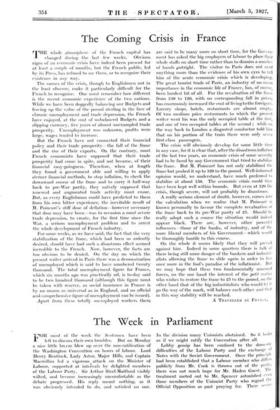The Corning Crisis in France T HE whole atmosphere of the
French capital has changed during the last few weeks. Obvious signs of an economic crisis have indeed been present for at least a couple of months, but the French public, led by its Press, has refused to sec them, or to recognize their existence in any way.
The causes of the crisis, though to Englishmen not in the least obscure, make it particularly difficult for the French to recognize. One must remember how different is the recent economic experience of the two nations. While we have been doggedly balancing our Budgets and forcing up the value of the pound sterling in the face of chronic unemployment and trade depression, the French have enjoyed, at the cost of unbalanced Budgets and a slipping currency, five years of almost unexampled trade prosperity. Unemployment was unknown, profits were large, wages tended to increase.
But the French have not connected their financial policy and their trade prosperity—the fall of the franc and the rise of their exports. On the contrary, most French economists have supposed that their trade prosperity had come in spite, and not because, of their financial easy-goingness. Therefore, when at length they found a government able and willing to apply sterner financial methods, to stop inflation, to check the downward course of the franc and to carry it half-way back to pre-War parity, they naïvely supposed that renewed and augmented trade activity must ensue. But, as every Englishman could have predicted to them from his own bitter experience, the inevitable result of M.Poineares stiff dose of deflation—however necessary that dose may have been--was to occasion a most severe trade depression, to create, for the first time since the NVar, a serious unemployment problem and to arrest the whole development of French industry.
For some weeks, as we have said, the fact that the very stabilization of the franc, which had been so ardently desired, should have had such a disastrous effect seemed incredible to the French. Now, however, the facts are too obvious to be denied. On the day on which the present writer arrived in Paris there was a demonstration of unemployed which is said to have numbered twenty thousand. The total unemployment figure for France, which six months ago. was practically nil, is to-day said to be two hundred thousand (although this figure must be taken with reserve, as social insurance in France is by no means as universal as in England, and no official and comprehensive figure of unemployment can be issued).
Apart from these totally unemployed workers there arc said to be many more on short time, for the Govern- ment has asked the big employers of labour to place their whole staffs on short time rather than to dismiss a number of hands putright. The visitor to Paris does not need anything more than the evidence of his own eyes to tell him of the acute economic crisis which is developing.
The great tourist trade of Paris, an industry of no mean importance in the economic life of France, has, of course, been hardest hit of all. For the revaluation of the franc from 240 to 120, with no corresponding fall in prices, has enormously increased the cost of living to the foreigner. Luxury shops, hotels, restaurants are almost empty. Of two medium price restaurants to which the present writer went his was the only occupied table at the first, and one of two occupied tables at the second ; while on the way back to London a disgusted conductor told him that on his portion of the train there were only seven first-class passengers.
The crisis will obviously develop for some little time in any case, for it is clear that, after the disastrous inflation of the last two years, an economic crisis of some severity had to be faced by any Government that tried to stabilize the franc. But M. Poincare has not only stabilized the franc but pushed it up to 120.to the pound. Well-informed opinion would, we understand, have much preferred to stabilize at about 150. The economic crisis could then have been kept well within bounds. But even at 120 the crisis, though severe, will not probably be disastrous.
A really serious element of doubt, however, comes into the calculation when we realize that M. Poineare is known personally to favour the complete revaluation of the franc back to its pre-War parity of 25. Should he really adopt such a course the situation would indeed appear black. There are, however, other powerful influences—those of the banks, of industry, and of the more liberal members of his Government—which would be thoroughly hostile to this course.
On the whole it seems likely that they will prevail against him. Indeed in some quarters there is talk of there being still some danger of the bankers and industri- alists allowing the franc to slide again in order to live once more in the fool's paradise of the inflationist. But we may hope that these two fundamentally unsound forces, on the one hand the interest of the petit reedier who wishes to restore the franc to 25 to the pound, on the other hand that of the big industrialists who would let it go the way of the mark, will balance each other and that in this way stability will be reached.
A TRAVELLER IX FRANcE.






























































 Previous page
Previous page